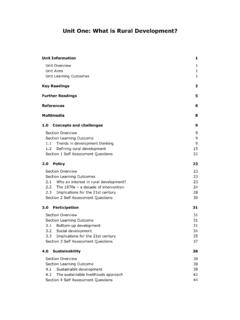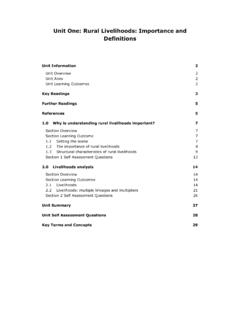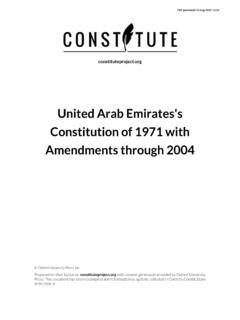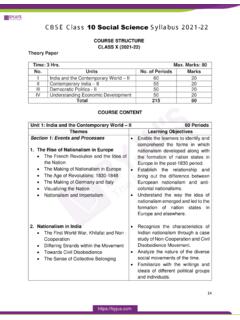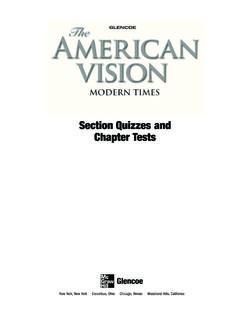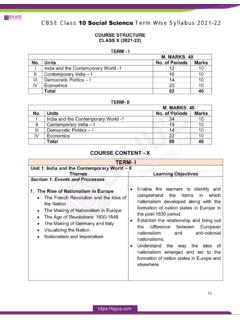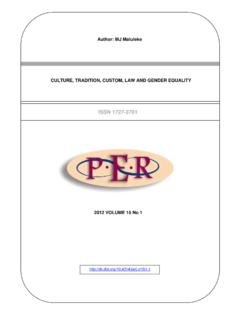Transcription of Unit 1: Introduction to Ethics
1 Unit One: Introduction to Ethics Unit Information 3 Unit Overview 3 Unit Aims 3 Unit Learning Outcomes 3 Unit Interdependencies 3 Key Readings 4 Further Readings 5 References 6 Multimedia 7 Why study Ethics ? 8 section Overview 8 section Learning Outcomes 8 What is philosophy ? 8 What is Ethics ? 11 Moral intuitions and critical reasoning 13 Environmental and development Ethics 16 section 1 Self Assessment Questions 20 Normative ethical traditions: identifying right and wrong 21 section Overview 21 section Learning Outcomes 21 Western ethical theories 21 Deontological Ethics 23 Teleological Ethics 26 Limitations of traditional normative theories 29 section 2 Self Assessment Questions 30 Key ethical issues: whose arguments count? 31 section Overview 31 section Learning Outcomes 31 Meta- Ethics 31 Ethical monism, relativism and pluralism 32 section 3 Self Assessment Questions 38 Unit Summary 39 Unit Self Assessment Questions 40 Key Terms and Concepts 41 P563 Ethics for Environment and Development Unit 1 SOAS CeDEP 3 UNIT INFORMATION Unit Overview This unit provides an Introduction to the study of Ethics and a brief overview of some of the main branches of philosophical thought about Ethics .
2 As well as introducing the central ideas that relate to environmental and development Ethics and how these two areas of ethical study are interrelated, this unit shows why Ethics as a discipline can provide useful tools for clarifying arguments, for understanding a range of viewpoints in a debate, and for justifying one s own ethical positions more clearly. Key conceptual frameworks and some key terms are introduced and explained. Unit Aims To introduce some key terms relating to the study of Ethics . To introduce some key ethical id eas, principles and frameworks. To explain the rationale for studying environmental and development Ethics and to examine how these areas of study are interrelated. Unit Learning Outcomes By the end of this unit, students should be able to: define the terms philosophy , Ethics , and morality outline the rationale for studying Ethics , particularly in relation to environmental and development concerns explain the difference between deontological and teleological Ethics define and briefly explain some of the key terms relating to ethical monism, relativism and pluralism Unit Interdependencies This unit provides a concise Introduction to the study of Ethics .
3 It introduces key ethical terms and concepts that recur throughout the other units of the module. Therefore it is recommended that you study this unit before attempting the other units, as it provides useful knowledge and understanding of those key terms and concepts. P563 Ethics for Environment and Development Unit 1 SOAS CeDEP 4 KEY READINGS section 1 Traer R (2013) Moral philosophy: an adventure in reasoning. In: Doing Environmental Ethics , 2nd edn. Westview Press, Boulder, Colorado, pp. 3 20. This chapter introduces the field of moral philosophy, from which much scholarly knowledge and understanding of Ethics derives. It explains that Ethics answers the question, How should we live? The chapter considers some fundamental themes, including ideas about what is right and good , and it examines ways of reasoning critically about our feelings.
4 The field of environmental Ethics is introduced, but the account presented in this chapter is also relevant to the theme of development Ethics . A variety of key terms are introduced and defined in this chapter. section 2 Wolf S (1982) Moral saints. Journal of Philosophy 79(8) 419 439. In this thought-provoking article, Susan Wolf argues that moral perfection, in the sense of moral saintliness , is not a particularly rational, good or desirable model of personal well-being toward which people should strive. In doing so, she presents a range of interesting and provocative ideas about normative Ethics . In particular, she argues that, at some point, we must be willing to raise normative questions from a perspective that is unattached to a commitment to any particular well-ordered system of values.
5 section 3 Traer R (2013) Ethics and science: moral consideration. In: Doing Environmental Ethics , 2nd edn. Westview Press, Boulder, Colorado, pp. 21 39. This chapter considers the relation between Ethics and science, focusing on the evolution of scientific knowledge. The problematic area of valuing nature is introduced. The chapter shows that, far from being detached from questions of values and Ethics , science plays a key role in those questions, because what we value depends on what we believe and that, in turn, is heavily influenced by science. P563 Ethics for Environment and Development Unit 1 SOAS CeDEP 5 FURTHER READINGS Crocker D (1996) International Development Ethics . Available from: Gasper D (2009) Development Ethics and Human Development. HD Insights, HDR Networks Issue 24, United Nations Development Programme (UNDP).
6 Available from: P563 Ethics for Environment and Development Unit 1 SOAS CeDEP 6 REFERENCES Callicott JB (1990) The case against moral pluralism. Environmental Ethics 12(2) 99 124. Crane A, Matten D (2007) Business Ethics : Managing Corporate Citizenship and Sustainability in the Age of Globalization, 2nd edn. Oxford University Press, Oxford. DesJardins J (2006) Business, Ethics and the Environment: Imagining a Sustainable Future. Pearson, Harlow. FAO (2004) The Ethics of Sustainable Agricultural Intensification. FAO Ethics Series 3, Food and Agriculture Organization of the United Nations (FAO), Rome. Gasper D (2004) The Ethics of Development. Edinburgh University Press, Edinburgh. LSULife (2007) What is Ethics ? Video. Duration minutes. Available from: [Accessed 05 August 2013] NatureServe (2010) Biodiversity Insights: Ten Reasons to Save the Diversity of Life.
7 Available from: [Accessed 05 August 2013] Popkin RH, Stroll A (1969) Philosophy Made Simple. WH Allen, London. Smith MJ, Pangsapa P (2008) Environment and Citizenship: Integrating Justice, Responsibility and Civic Engagement. Zed Books, London. Traer R (2009) Doing Environmental Ethics . Westview Press, Boulder, Colorado. Traer R (2013) Doing Environmental Ethics , 2nd edn. Westview Press, Boulder, Colorado. UN (2012) The Universal Declaration of Human Rights. Available from: [Accessed 05 August 2013] Worldwatch Institute (2012) State of the World 2012: Moving Toward Sustainable Prosperity. Worldwatch Institute, Washington DC. Wraight CD (2011) Ethics of Trade and Aid: Development, Charity or Waste? Continuum, London. P563 Ethics for Environment and Development Unit 1 SOAS CeDEP 7 MULTIMEDIA Carnegie Council (2009) Joel Rosenthal: Pluralism & Ethics .
8 Video. Duration minutes. Available from: This video clip, featuring the President of the Carnegie Council, Joel Rosenthal, focuses on ethical pluralism. It addresses the question, Where do we draw the line when deciding whose Ethics are legitimate? LSULife (2007) What is Ethics ? Video. Duration minutes. Available from: This short video clip shows a selection of university students attempting to define the term Ethics . TED (2009) Gordon Brown on Global Ethic vs. National Interest. Video. Duration minutes. Available from: This video clip shows the former UK Prime Minister, Gordon Brown, answering questions about the global ethic he called for. The video addresses the question of whether the interests of an individual nation can be reconciled with the greater good of humanity.
9 P563 Ethics for Environment and Development Unit 1 SOAS CeDEP 8 WHY STUDY Ethics ? section Overview The study of Ethics belongs primarily within the discipline of philosophy, in the sub-discipline of moral philosophy , and so our account begins there. Philosophical study concerns the systematic and rational consideration of human systems of belief. The process of asking and answering questions about belief systems is therefore fundamental to philosophical study it is not sufficient merely to learn the answers that have been proposed by other philosophers! The branch of philosophy called Ethics is concerned with questions concerning how human beings ought to live their lives, and about what is right or wrong . In this section we look at how philosophers attempt to answer such questions in a systematic and rational way.
10 This section also introduces the fields of environmental and development Ethics , and consider how these two fields of study are interrelated. section Learning Outcomes By the end of this section , students should be able to: define the terms philosophy , Ethics , and morality outline the rationale for studying Ethics , particularly in relation to environmental and development concerns What is philosophy ? What do philosophers do? What do you think philosophers do? How do they spend their time? Spend a few minutes thinking about what you know about philosophers past and present; if possible, try to identify some of the advances in knowledge that they have made. Try to write a brief definition of philosophy. What is the purpose of doing philosophy? As human beings live their lives, they acquire a wealth of information about the world around them that they use to build up a collection of ideas about the world and their place within it.






